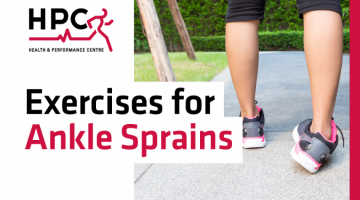Physiotherapist Spotlight: Black History Month 2021

With the month of February marking Black History Month we caught up with HPC physiotherapist Jeannette Johnson for a Q&A about her career in physiotherapy and what Black History Month means to her.
Jeannette is a proud UofG alum, who competed at the varsity level as a sprinter with the Gryphons women's track and field team while pursuing her undergraduate degree in human kinetics. Aside from her natural interest in treating running injuries, Jeannette's other clinical interests include dance rehabilitation, Pilates rehabilitation, TMJ, and lower body injuries.
Q: What encouraged you to enter a career in physiotherapy?
I’ve had an interest in science for as long as I can remember. I would actually watch exercise shows and fitness equipment infomercials regularly as a child, intrigued by the applications of exercise science. During my time as a volunteer at the HPC while attending UofG, I found a passion for a career in physiotherapy that wasn’t there for any other career I considered. Restoring movement is powerful. Whether clients were gearing up to run an ultra-marathon or wanting to be able to get on the floor to play with their grandchildren, I wanted to be one of the people working one-on-one with them to get them back to doing what was meaningful in their lives. Helping clients to achieve their rehab goals has never gotten old for me. I actually seem to be falling in love with my job more and more each year!
Q: What does Black History Month mean to you?
Black History Month is a time when the world is more willing to acknowledge the rich and complicated history, present struggles, and accomplishments of the Black community. Prior to 2020, this was often the only time that such dialogue was welcomed or encouraged. I strongly believe that this dialogue shouldn’t just be isolated to the shortest month of the year, but that we should continually strive to understand each other, eradicate prejudices, and challenge societal norms that have propagated racial oppression.
While on a campus tour at UofG in grade twelve, I remember counting the number of Black people that I saw on campus. In the years that followed, I was excited that I was now among those counted by prospective Black students at UofG. As a Black physiotherapist, I don’t take it lightly that I’m in a profession that is underrepresented by Black people in Canada. It is my hope to inspire the next generation of Black healthcare professionals.
Q: Who has been your most influential professional mentor?
The entire team at the HPC has been my biggest source of professional mentorship. Colleagues from all disciplines have always been willing to share their knowledge and skills, which has helped me to grow as a physiotherapist. It’s always a great feeling to apply a new treatment or assessment technique and know that I learned it from one of my colleagues. They inspire me to be a lifelong learner and to always strive to be better at what I do.
Q: Any career advice for future physiotherapists?
Never stop pursuing your passions! Physiotherapy is a broad field, so don’t be afraid to go in the direction that sparks your interest. You can create a niche for yourself by taking courses and finding mentors that align with where you want to be.
For more information on the collaborative team of practitioners and physiotherapists at the University of Guelph's Health and Performance Centre, head to the HPC homepage.
Related:



